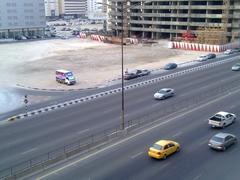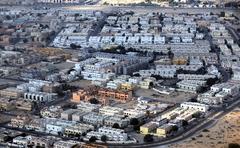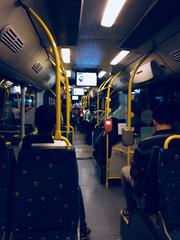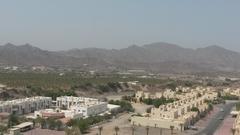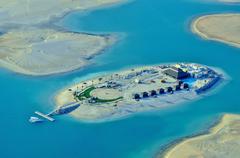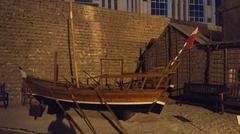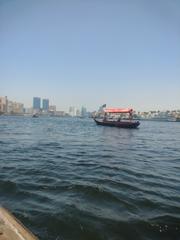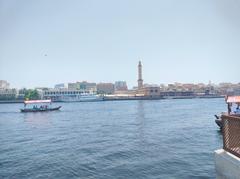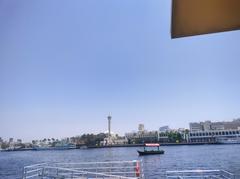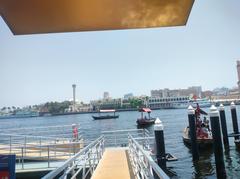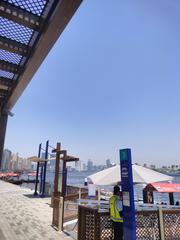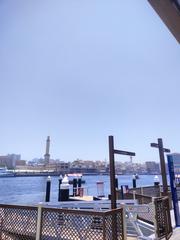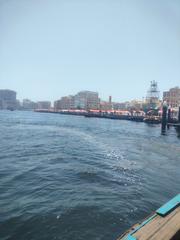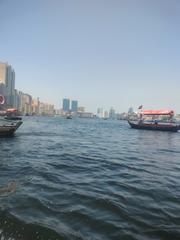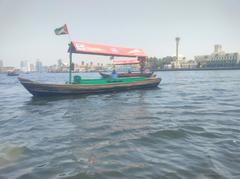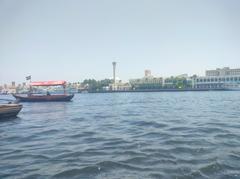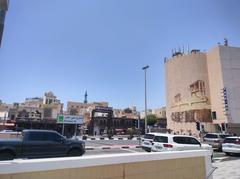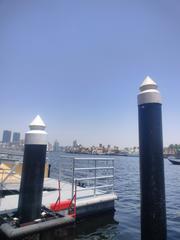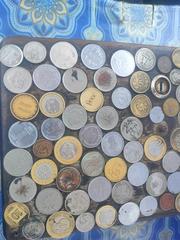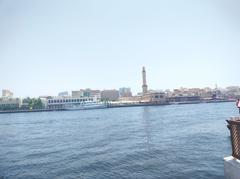
Comprehensive Guide to Visiting the Emirate of Dubai, United Arab Emirates
Date: 14/08/2024
Captivating Introduction
Picture a city where the sands of time meet the cutting edge of modernity, where ancient souks stand in the shadow of the tallest skyscrapers, and the call to prayer mingles with the hum of futuristic technology. Welcome to Dubai, the crown jewel of the United Arab Emirates, a city that defies expectations and reinvents itself at every turn. From its humble beginnings as a small fishing village to its meteoric rise as a global metropolis, Dubai’s history is as rich and complex as its skyline. The discovery of oil in the 1960s was a game-changer, catapulting this once-sleepy town into a whirlwind of development and prosperity (Travel to Dubai Blog). But oil is just one chapter in Dubai’s story. Today, the city is a dazzling mosaic of finance, tourism, real estate, and aviation, strategically positioned at the crossroads of Europe, Asia, and Africa (CNN).
Yet, Dubai is not just about economic marvels; it is a cultural kaleidoscope where ancient Bedouin traditions blend seamlessly with influences from over 200 nationalities (Danni B in Dubai). This guide will take you on a journey through Dubai’s multifaceted significance, from its awe-inspiring architectural wonders like the Burj Khalifa to its bustling marketplaces, and from its luxurious hotels to its tranquil desert landscapes. Whether you’re a history buff, a culture vulture, or an adventure seeker, Dubai has something to offer everyone. Ready to uncover the secrets of this ever-evolving city? Let’s dive in!
Table of Contents
- Historical Overview
- Early History and Formation
- British Influence and the Trucial States
- Discovery of Oil and Economic Transformation
- Formation of the United Arab Emirates
- A Journey Through Time: Key Developments in the Late 20th Century
- 21st Century: A Global Metropolis
- Cultural and Social Developments
- Visitor Tips for Exploring Dubai’s History
- Discovering Dubai: A Tale of Wonders and Whispers
- Economic Marvels: Beyond the Gold Rush
- Cultural Kaleidoscope: Old Meets New
- Architectural Wonders: Touching the Sky
- Tourism Treasures: A Wonderland Awaits
- Social Symphony: Harmony in Diversity
- Environmental Endeavors: Green Ambitions
- Educational Excellence: Knowledge is Power
- Technological Triumphs: Future Forward
- Health and Safety: A Secure Haven
Historical Overview of Dubai
Early History and Formation
Dubai didn’t just spring up overnight like a desert mirage. This city has stories that go back centuries, and not all of them involve oil or gold. The region now known as Dubai was originally a small fishing village. The earliest recorded mention of Dubai dates back to 1095 in the “Book of Geography” by Andalusian-Arab geographer Abu Abdullah al-Bakri. Significant development began in the 19th century when the Al Maktoum dynasty took control in 1833, establishing Dubai as a major trading port.
British Influence and the Trucial States
In the early 19th century, piracy along the Gulf coast prompted the British to intervene. In 1820, local rulers, including those from Dubai, signed a treaty with Britain to combat piracy, marking the beginning of British influence in the region (BBC). By 1892, the Trucial States, including Dubai, had entered into a more formal agreement with Britain, giving Britain control over foreign affairs while allowing each emirate to manage its internal affairs.
Discovery of Oil and Economic Transformation
The discovery of oil in the 1950s marked a turning point for Dubai and the UAE. Oil was first discovered in Dubai in 1966, and the first shipment was exported in 1969. This newfound wealth spurred rapid development and modernization. Sheikh Rashid bin Saeed Al Maktoum, the then-ruler of Dubai, used oil revenues to develop infrastructure, including roads, schools, and hospitals, laying the foundation for Dubai’s transformation into a global city (Wikipedia).
Formation of the United Arab Emirates
The British decision to withdraw from the Trucial States in 1968 led to the formation of the UAE. On December 2, 1971, Dubai, along with Abu Dhabi and five other emirates, formed the United Arab Emirates. Sheikh Zayed bin Sultan Al Nahyan of Abu Dhabi and Sheikh Rashid bin Saeed Al Maktoum of Dubai were instrumental in this union. Ras Al Khaimah joined the federation in 1972 (The National News).
A Journey Through Time: Key Developments in the Late 20th Century
Economic Diversification
In the 1980s and 1990s, Dubai began to diversify its economy to reduce its dependence on oil. The establishment of the Jebel Ali Free Zone in 1985 attracted foreign investment and boosted trade. The launch of Emirates Airline in 1985 further positioned Dubai as a global aviation hub (The National News).
Infrastructure and Tourism
Dubai’s focus on infrastructure development continued with the construction of iconic landmarks. The Burj Al Arab, a luxury hotel, was completed in 1999, symbolizing Dubai’s ambition to become a global tourism destination. The Jumeirah Emirates Towers, completed in 2000, became the tallest building in the Middle East at the time (The National News).
21st Century: A Global Metropolis
Burj Khalifa and Modern Landmarks
The opening of the Burj Khalifa in 2010 marked Dubai’s emergence as a global city. Standing at 828 meters, it is the tallest building in the world and a symbol of Dubai’s architectural prowess. The Dubai Mall, located at the base of the Burj Khalifa, is one of the largest shopping malls globally, attracting millions of visitors annually (BBC).
Economic Challenges and Resilience
Dubai faced significant economic challenges during the global financial crisis of 2008-2009. In November 2009, Dubai World, a government-owned investment company, requested a moratorium on debt repayments, raising fears of a financial collapse. However, a $10 billion bailout from Abu Dhabi helped stabilize the situation (BBC).
Expo 2020 and Future Prospects
Dubai’s successful bid to host Expo 2020 was a testament to its global ambitions. Originally scheduled for 2020 but postponed to 2021 due to the COVID-19 pandemic, Expo 2020 showcased Dubai’s innovation and attracted millions of visitors from around the world. The event highlighted Dubai’s role as a global hub for trade, tourism, and innovation (The National News).
Cultural and Social Developments
Embracing Modernity While Preserving Heritage
Dubai has managed to balance rapid modernization with the preservation of its cultural heritage. The Al Fahidi Historical Neighborhood, also known as Al Bastakiya, offers a glimpse into Dubai’s past with its traditional wind-tower architecture and narrow lanes. The Dubai Museum, housed in the Al Fahidi Fort, provides insights into the city’s history and culture (Saadatrent).
Social and Legal Reforms
In recent years, Dubai has implemented several social and legal reforms to enhance its appeal to expatriates and tourists. These include changes to personal status laws, allowing for more flexibility in matters such as cohabitation and alcohol consumption. These reforms reflect Dubai’s commitment to creating a more inclusive and welcoming environment for its diverse population (Condé Nast Traveler).
Visitor Tips for Exploring Dubai’s History
Key Historical Sites
- Al Fahidi Historical Neighborhood: Explore traditional Emirati architecture and visit the Dubai Museum.
- Sheikh Saeed Al Maktoum House: A historic building that offers insights into the life of Dubai’s former ruler.
- Jumeirah Archaeological Site: Discover artifacts from the 6th century, showcasing Dubai’s ancient history.
Cultural Etiquette
- Dress Modestly: While Dubai is relatively liberal, it is advisable to dress modestly, especially in traditional areas.
- Respect Local Customs: Avoid public displays of affection and be mindful of local customs during the holy month of Ramadan (Saadatrent).
Practical Information
- Currency: The official currency is the UAE Dirham (AED).
- Language: Arabic is the official language, but English is widely spoken.
- Best Time to Visit: The cooler months from November to March are ideal for exploring Dubai’s historical sites (ViaTravelers).
By understanding Dubai’s rich history and cultural heritage, visitors can gain a deeper appreciation of this dynamic city. From its humble beginnings as a fishing village to its rise as a global metropolis, Dubai’s history is a testament to its resilience and ambition. Ready to uncover Dubai’s secrets? Download Audiala, your perfect travel companion, and let the city’s stories come to life in your ears.
Discovering Dubai: A Tale of Wonders and Whispers
Economic Marvels: Beyond the Gold Rush
Dubai’s metamorphosis from a sleepy fishing village to a glittering global economic titan is like something out of a fairy tale. Picture this: the discovery of oil in the 1960s was akin to finding Aladdin’s lamp! This windfall funded a whirlwind of infrastructure development, transforming the cityscape and elevating living standards (Travel to Dubai Blog). Today, Dubai’s economy is a dazzling mosaic of finance, tourism, real estate, and aviation.
Strategically perched between Europe, Asia, and Africa, Dubai is a bustling crossroads of international trade. Jebel Ali Port, the world’s largest man-made harbor, and Dubai International Airport, the busiest for international travelers, are jewels in its logistical crown (CNN). These hubs are the heartbeats of a city that never sleeps.
Cultural Kaleidoscope: Old Meets New
Imagine a city where ancient Bedouin traditions dance harmoniously with modern influences from over 200 nationalities (Danni B in Dubai). Dubai’s cultural scene is a vibrant mosaic of flavors, festivals, and art. You might find an art exhibition next door to a camel race, or a falconry display near a contemporary dance show.
The Dubai Museum, in the historic Al Fahidi Fort, whispers tales of yesteryear, while the Etihad Museum chronicles the UAE’s formation. Annual events like the Dubai Shopping Festival and Food Festival spotlight this cultural melting pot.
Architectural Wonders: Touching the Sky
Dubai’s skyline is a futuristic fantasy brought to life. The Burj Khalifa, piercing the sky at 828 meters, is a testament to human ambition (Travel to Dubai Blog). The Palm Jumeirah, an artificial archipelago, is a marvel of human ingenuity.
The Dubai Mall, a shopper’s paradise, and the opulent Burj Al Arab, a 7-star hotel, are not just buildings but symbols of Dubai’s grand dreams. These iconic structures draw millions of visitors and stand as emblems of economic and cultural aspirations.
Tourism Treasures: A Wonderland Awaits
Tourism is Dubai’s lifeblood, pumping vitality into its economy. The city drew 7.9 million visitors in the first nine months of 2013, with numbers soaring since (Gulf News). Dubai’s Vision 2020 aimed for 20 million visitors by 2020, underscoring its global allure.
From luxury shopping and gourmet dining to desert adventures and cultural escapades, Dubai offers a cornucopia of experiences. The Dubai Desert Conservation Reserve showcases nature’s splendor, while the Dubai Opera and myriad galleries offer artistic indulgence. The city’s family-friendly vibe, top-notch infrastructure, and safety make it a magnet for global travelers (CNN).
Social Symphony: Harmony in Diversity
Dubai’s explosive growth has woven a cosmopolitan tapestry of diverse voices. Expatriates from around the globe call this city home, creating a melting pot of tolerance and inclusivity (Danni B in Dubai).
The UAE’s leadership champions cultural diversity through various initiatives, fostering a society where different cultures coexist and contribute to the city’s dynamic ethos.
Environmental Endeavors: Green Ambitions
Dubai’s rapid urbanization has spurred a green revolution. The Dubai Clean Energy Strategy 2050 aspires to make Dubai a beacon of clean energy and sustainability (Gulf News). Projects like the Mohammed bin Rashid Al Maktoum Solar Park, poised to be the largest single-site solar park, are steps toward this green vision.
Eco-friendly hotels and green building standards underscore Dubai’s commitment to sustainable tourism, vital for its long-term prosperity and global prestige.
Educational Excellence: Knowledge is Power
Dubai’s educational strides are monumental, attracting international universities and establishing premier institutions. Dubai International Academic City hosts a plethora of global universities (Visit Dubai).
The city’s focus on education aligns with its vision of a knowledge-based economy, offering a spectrum of programs to meet the diverse needs of its residents and expatriates.
Technological Triumphs: Future Forward
Dubai is a tech pioneer, leveraging cutting-edge innovations to enhance its infrastructure and services. The Dubai Smart City project aims to make Dubai the happiest city on earth through technology (Gulf News).
Initiatives like the Dubai Future Accelerators foster collaboration between government and startups, ensuring the city’s tech-savvy edge on the global stage.
Health and Safety: A Secure Haven
Dubai’s emphasis on health and safety makes it one of the safest cities globally. Its healthcare system is top-tier, with numerous hospitals and clinics providing high-quality care. The city’s stringent customs and security measures ensure a secure haven for residents and visitors (CNN).
Conclusion: The Ever-Evolving Jewel
Dubai’s multifaceted significance spans economic prowess, cultural richness, architectural splendor, and sustainable ambitions. Its rapid evolution and strategic initiatives have cemented its status as a global hub for trade, tourism, and innovation. As Dubai continues to evolve, the Audiala tour guide app offers a gateway to the city’s secrets and stories. Download Audiala and unlock Dubai’s wonders, creating your own unforgettable adventure.
Call to Action
Dubai is a city that constantly pushes the boundaries of what is possible, a place where tradition and innovation coexist in perfect harmony. Its rapid transformation from a modest fishing village to a global powerhouse is a testament to its resilience and ambition. As you explore Dubai, you’ll find that every corner of the city tells a story—whether it’s the ancient tales whispered by the Dubai Museum or the futuristic dreams embodied by the Burj Khalifa. The city’s commitment to sustainability, cultural diversity, and technological advancements ensures that it remains at the forefront of global development (Gulf News).
But Dubai is more than just its iconic landmarks and economic achievements; it’s a living, breathing entity shaped by its diverse inhabitants and rich history. From the bustling souks to the serene desert landscapes, Dubai offers a unique blend of experiences that cater to all tastes and interests. As you navigate this guide, I hope you uncover not just the city’s well-known attractions but also its hidden gems and local secrets.
For an enriched experience, don’t forget to download Audiala, your perfect travel companion. With expertly crafted audio guides, Audiala brings Dubai’s stories to life, offering deeper insights and uncovering hidden gems that even seasoned travelers might miss. So go ahead, unlock the secrets of Dubai and create memories that will last a lifetime.
